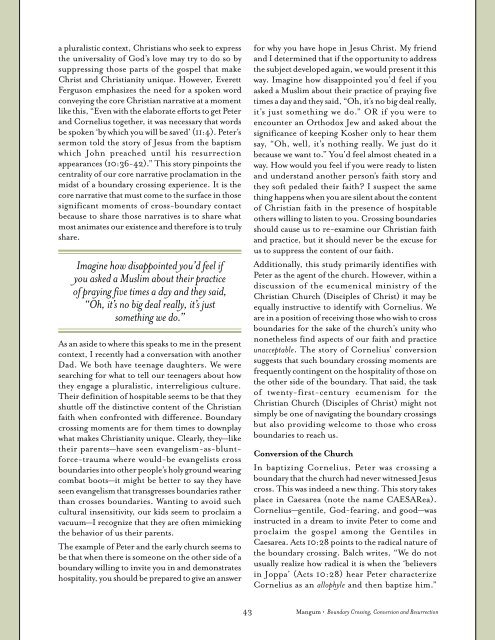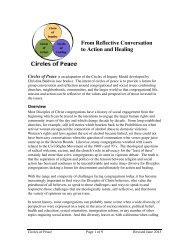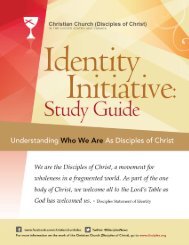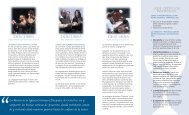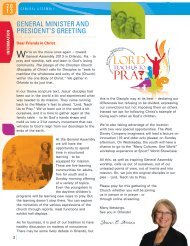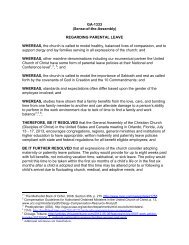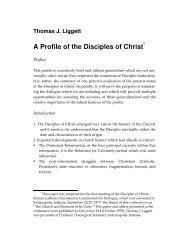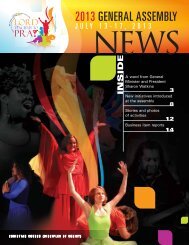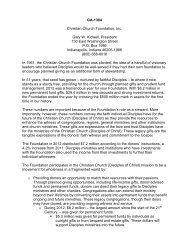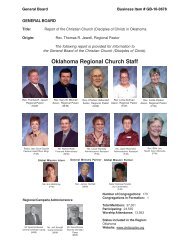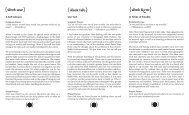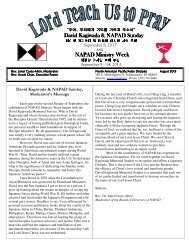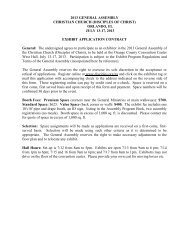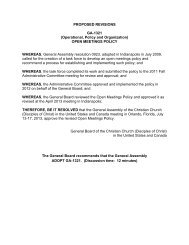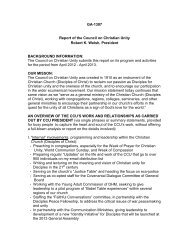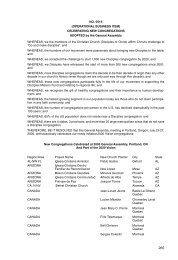RESOURCING THE CHURCH FOR ECUMENICAL MINISTRy A ...
RESOURCING THE CHURCH FOR ECUMENICAL MINISTRy A ...
RESOURCING THE CHURCH FOR ECUMENICAL MINISTRy A ...
You also want an ePaper? Increase the reach of your titles
YUMPU automatically turns print PDFs into web optimized ePapers that Google loves.
a pluralistic context, Christians who seek to express<br />
the universality of God’s love may try to do so by<br />
suppressing those parts of the gospel that make<br />
Christ and Christianity unique. However, Everett<br />
Ferguson emphasizes the need for a spoken word<br />
conveying the core Christian narrative at a moment<br />
like this, “Even with the elaborate efforts to get Peter<br />
and Cornelius together, it was necessary that words<br />
be spoken ‘by which you will be saved’ (11:4). Peter’s<br />
sermon told the story of Jesus from the baptism<br />
which John preached until his resurrection<br />
appearances (10:36-42).” This story pinpoints the<br />
centrality of our core narrative proclamation in the<br />
midst of a boundary crossing experience. It is the<br />
core narrative that must come to the surface in those<br />
significant moments of cross-boundary contact<br />
because to share those narratives is to share what<br />
most animates our existence and therefore is to truly<br />
share.<br />
Imagine how disappointed you’d feel if<br />
you asked a Muslim about their practice<br />
of praying five times a day and they said,<br />
“Oh, it’s no big deal really, it’s just<br />
something we do.”<br />
As an aside to where this speaks to me in the present<br />
context, I recently had a conversation with another<br />
Dad. We both have teenage daughters. We were<br />
searching for what to tell our teenagers about how<br />
they engage a pluralistic, interreligious culture.<br />
Their definition of hospitable seems to be that they<br />
shuttle off the distinctive content of the Christian<br />
faith when confronted with difference. Boundary<br />
crossing moments are for them times to downplay<br />
what makes Christianity unique. Clearly, they—like<br />
their parents—have seen evangelism-as-bluntforce-trauma<br />
where would-be evangelists cross<br />
boundaries into other people’s holy ground wearing<br />
combat boots—it might be better to say they have<br />
seen evangelism that transgresses boundaries rather<br />
than crosses boundaries. Wanting to avoid such<br />
cultural insensitivity, our kids seem to proclaim a<br />
vacuum—I recognize that they are often mimicking<br />
the behavior of us their parents.<br />
The example of Peter and the early church seems to<br />
be that when there is someone on the other side of a<br />
boundary willing to invite you in and demonstrates<br />
hospitality, you should be prepared to give an answer<br />
43<br />
for why you have hope in Jesus Christ. My friend<br />
and I determined that if the opportunity to address<br />
the subject developed again, we would present it this<br />
way. Imagine how disappointed you’d feel if you<br />
asked a Muslim about their practice of praying five<br />
times a day and they said, “Oh, it’s no big deal really,<br />
it’s just something we do.” OR if you were to<br />
encounter an Orthodox Jew and asked about the<br />
significance of keeping Kosher only to hear them<br />
say, “Oh, well, it’s nothing really. We just do it<br />
because we want to.” You’d feel almost cheated in a<br />
way. How would you feel if you were ready to listen<br />
and understand another person’s faith story and<br />
they soft pedaled their faith? I suspect the same<br />
thing happens when you are silent about the content<br />
of Christian faith in the presence of hospitable<br />
others willing to listen to you. Crossing boundaries<br />
should cause us to re-examine our Christian faith<br />
and practice, but it should never be the excuse for<br />
us to suppress the content of our faith.<br />
Additionally, this study primarily identifies with<br />
Peter as the agent of the church. However, within a<br />
discussion of the ecumenical ministry of the<br />
Christian Church (Disciples of Christ) it may be<br />
equally instructive to identify with Cornelius. We<br />
are in a position of receiving those who wish to cross<br />
boundaries for the sake of the church’s unity who<br />
nonetheless find aspects of our faith and practice<br />
unacceptable. The story of Cornelius’ conversion<br />
suggests that such boundary crossing moments are<br />
frequently contingent on the hospitality of those on<br />
the other side of the boundary. That said, the task<br />
of twenty-first-century ecumenism for the<br />
Christian Church (Disciples of Christ) might not<br />
simply be one of navigating the boundary crossings<br />
but also providing welcome to those who cross<br />
boundaries to reach us.<br />
Conversion of the Church<br />
In baptizing Cornelius, Peter was crossing a<br />
boundary that the church had never witnessed Jesus<br />
cross. This was indeed a new thing. This story takes<br />
place in Caesarea (note the name CAESARea).<br />
Cornelius—gentile, God-fearing, and good—was<br />
instructed in a dream to invite Peter to come and<br />
proclaim the gospel among the Gentiles in<br />
Caesarea. Acts 10:28 points to the radical nature of<br />
the boundary crossing. Balch writes, “We do not<br />
usually realize how radical it is when the ‘believers<br />
in Joppa’ (Acts 10:28) hear Peter characterize<br />
Cornelius as an allophyle and then baptize him.”<br />
Mangum • Boundary Crossing, Conversion and Resurrection


